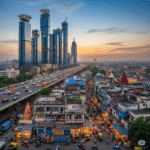An exploration of Rajasthan’s dynamic political landscape and its potential for development.
Key Metrics: Rajasthan’s Political Profile
- Lok Sabha Seats: 25 (4.6% of total seats in Parliament).
- Rajya Sabha Seats: 10 (3.7% of total).
- Population: Over 81 million (2023 estimate).
- Voter Base: Approximately 55 million registered voters.
- Literacy Rate: 66.1% (Census 2011).
- Urbanization: Around 24.9%, with key cities like Jaipur, Jodhpur, and Udaipur as cultural and economic hubs.
(Source: Election Commission of India, Ministry of Statistics and Programme Implementation)
Introduction
Rajasthan, known for its vibrant culture and historical significance, holds a critical position in India’s political framework. With its 25 Lok Sabha seats, the state plays a pivotal role in shaping the national government, often serving as a bellwether for political trends. Despite its rich heritage and economic potential, Rajasthan faces challenges ranging from agrarian distress to regional disparities. This article examines the state’s political climate, highlighting its challenges and prospects for growth.
Challenges in Rajasthan’s Political Climate
1. Agrarian Distress
Agriculture, the backbone of Rajasthan’s economy, faces recurring challenges due to the state’s arid climate and water scarcity.
- Key Issues:
- Over-dependence on monsoons and limited irrigation facilities.
- Stagnant crop prices and high input costs leading to farmer unrest.
- Political Implications:
- Agrarian distress has often dominated election campaigns, with political parties focusing on debt waivers and subsidies.
(Source: Ministry of Agriculture and Farmers Welfare)
2. Regional Disparities
While cities like Jaipur and Udaipur thrive, regions like Barmer and Bikaner face underdevelopment.
- Challenges:
- Unequal access to education, healthcare, and infrastructure.
- Persistent poverty in rural and semi-arid regions.
(Source: NITI Aayog State Reports)
3. Political Instability and Factionalism
Rajasthan’s politics have been marked by intense rivalry between the Bharatiya Janata Party (BJP) and the Congress, often leading to governance disruptions.
- Recent Trends:
- Infighting within parties, such as the power struggle within the state Congress, has affected policy implementation.
(Source: PRS Legislative Research)
4. Youth Unemployment
With a significant youth population, unemployment remains a pressing issue, leading to voter dissatisfaction.
- Impact on Politics:
- Rising unemployment has fueled demands for job creation and skill development, becoming a focal point in elections.
(Source: Ministry of Skill Development and Entrepreneurship)
Growth Prospects in Rajasthan’s Political Landscape
1. Infrastructure Development
Rajasthan’s strategic location makes it a hub for industrial corridors and trade routes.
- Opportunities:
- Expansion of road and rail connectivity under the Bharatmala and Dedicated Freight Corridor projects.
- Investments in smart cities like Jaipur and Jodhpur to boost urban development.
(Source: Ministry of Road Transport and Highways)
2. Renewable Energy Potential
Rajasthan’s vast desert landscape positions it as a leader in renewable energy.
- Key Initiatives:
- Development of solar parks under the National Solar Mission.
- Investments in wind energy projects across the state.
(Source: Ministry of New and Renewable Energy)
3. Tourism and Cultural Heritage
With its iconic forts, palaces, and festivals, Rajasthan has immense potential to drive economic growth through tourism.
- Government Focus:
- Initiatives like Dekho Apna Desh to promote domestic tourism.
- Enhanced infrastructure around key tourist destinations to attract international visitors.
(Source: Ministry of Tourism)
4. Empowering Women and Marginalized Communities
Inclusive governance focusing on education, healthcare, and entrepreneurship for women and marginalized groups can transform Rajasthan’s socio-political landscape.
- Programs:
- Expansion of self-help groups under schemes like Deendayal Antyodaya Yojana.
- Skill development initiatives targeting rural women.
(Source: Ministry of Women and Child Development)
Political Dynamics in Rajasthan
1. BJP vs. Congress Dominance
Rajasthan remains a two-party battleground, with the BJP and Congress alternating power in most elections.
- BJP:
- Focuses on infrastructure development, welfare schemes, and national security.
- Congress:
- Prioritizes farmer welfare, social justice, and employment generation.
2. Role of Regional Players
While BJP and Congress dominate, smaller regional parties and independents influence specific constituencies.
- Example:
- The emergence of the Rashtriya Loktantrik Party (RLP) reflects growing regional aspirations.
Expert Opinions
- Political Analyst’s Insight:
- “Rajasthan’s political climate reflects India’s broader democratic challenges, with its electoral outcomes often setting the tone for national politics.”
- Economist’s Perspective:
- “By leveraging its strengths in renewable energy, tourism, and agriculture, Rajasthan can address socio-economic challenges and drive inclusive growth.”
(Source: PRS Legislative Research)
What Lies Ahead for Rajasthan?
1. Balancing Rural and Urban Development
Addressing regional disparities will be key to sustaining voter trust and ensuring equitable growth.
2. Investing in Youth and Employment
Expanding skill development programs and industrial jobs can harness Rajasthan’s demographic dividend.
3. Strengthening Governance
Resolving intra-party conflicts and promoting policy continuity will enhance governance efficiency.
Conclusion
Rajasthan’s political climate, shaped by its unique challenges and opportunities, plays a critical role in India’s democratic framework. While issues like agrarian distress and unemployment persist, the state’s growth prospects in infrastructure, renewable energy, and tourism offer a promising future. As Rajasthan continues to navigate its dynamic political landscape, effective governance and inclusive policies will determine its trajectory in fostering socio-economic development and contributing to national progress.







